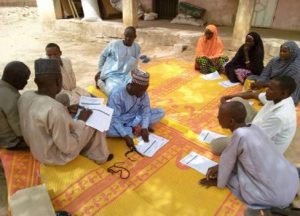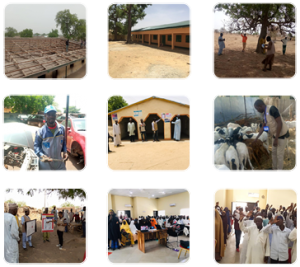NERI’s Early Warning Intervention gives lifeline to once distressed Borno Communities
Our communities were in turmoil and total state of disarray…. This project is a life saver. It has given our communities another lifeline

Community members deliberating during a CRN meeting.
Picture: CCDRN
May 2018 — 43-year old Baba Gana Umar from Bula Karaye community in Gubio LGA of Borno is a beneficiary of the North East Regional Initiative’s ‘Strengthening Early Warning and Early Response Mechanism intervention being implemented in Nigeria’s Northeast region.. He recalled with a deep breath how gloomy things were for him and his community in the heat of the Boko Haram attacks. Umar narrated how he fled the raging violence in November of 2014, with his two wives and ten children to the state capital in Maiduguri. He later returned to his community in late 2015, after the military forces succeeded in pushing the insurgents to the fringes but despondently, he met a community that was broken and torn apart. The insurgency left bedlam and anarchy in its wake. Hitherto, years after fragile peace returned to the community, the existing communal fabric still suffers the aftermath of the insurgency.
Bula Karaye, Umar’s community is in Gubio Local Government Area, which was created in 1991. It is located in north Western part of the State about 86km away from the State capital. The LGA is one of the sixteen (16) LGAs that constitute Borno Emirate Council and also shares common boundaries with Guzamala, Nganzai to east, Magumeri to the southeast, Mobbar to the northwest and Geidam of Yobe State to the west. It also suffered its own share of the insurgency by non-state armed group, the Boko Haram.
“Our communities were in turmoil and total state of disarray. Drug abuse was rampant and clashes between farmers and herders were common place. Our young people became almost useless and are open tool in the hands of the insurgents who lure them with money and drugs. The police station is always flowing withy complains and never ending cases of conflict. No one was able to do anything at community level even our village heads were no longer respected as it was before” says Umar.
However, Umar and these communities saw lights at the end of the tunnel. Things are now gradually changing after NERI intervention with a component of its Strengthening Early Warning and Early Response Mechanism in 12 communities across four LGAs in Borno. NERI in partnership with Centre for Community Development and Research Network CCDRN, worked with community based organizations, parents, local councils, traditional leaders, religious leaders, youth leaders, market women, private security practitioners and other stake holders to specifically identify and rein back identified early warning signs in these communities namely: Kachallari, Baram Karuwa, Bula Karaye and Ngarta communities of Gubio LGA, Kareto, Zanna Umarti and Damasak communities of Mobbar LGA as well as Magumeri central, Gaji Ganna and Kunmeli communities of Magumeri LGA and others in Nganzai. These are vulnerable communities where frequent sightings of the insurgents are consistently reported. However, there was no formal Early Warning System that exists in the focal communities, despite their locations in the hinterland where insurgents are sighted frequently on recruitment drive.
Umar, who a beneficiary of the NERI intervention aimed at to strengthen, formalize and expand communities’ capacity to organize, network, identify and respond to early warning signs in the identified communities and 119 other community members received advanced training and mentorship support on how to identify and tackle early warning signs for enhanced community oriented approach to solving problems. In the course of the project which is now on the verge of closing out, Umar and others put to use all they learnt from the training by CCDRN. He was quite elated when he narrated how the intervention helped in salvaging his community from the ruins of the Boko Haram carnage and its attendant watershed. Umar further shares his experience.
“This project is a life saver. It has given our communities another lifeline. The intervention has helped us to properly coordinate things at our community level to solve problems. Previously we are unable to intervene in community clashes because the boko haram violence came with its resultant crisis which includes drug abuse, gambling, disrespect for elders and total disregard for communal values. We are now able to solve these crises” Umar said. “Through our CRN meetings, issues are reported and we even resolve them before it escalates into conflict. We have been able to prevent a lot of conflict between farmers and herdsmen. If there is any disagreement on both ends, it is quickly reported to the CRN and we call both parties and talk it through till we find an amicable solution. We thank and appreciate NERI and CCDRN for this effort” he added.
Just like Umar, others from the 12 communities targeted for the intervention have their own stories to tell. To Ali Bukar from Magumeri 2, the intervention is helping his community to regain its lost cultural heritage. An elated Bukar describes how the community oriented early warning mechanism used to be what was obtainable with his forefathers many years ago.
“This program has done a lot for us. What we are learning now is what was obtainable with our elders before, but civilization withered it. Now this project has helped to strengthen early warning signs among us. We are now able to solve problem and issues related in our community like it was done in the olden days” Bukar said, adding that “I am very happy with what you people have done. This has helped to reawaken our consciousness. I want to appeal that this should also reach other communities that have not been reached. We intend to continue with this initiative because to us it is like a little child who has been given birth to and nurtured; it grows and takes care of itself. That is how we look at this”.
Specifically, the implementing partners, CCDRN at the behest of NERI, trained and provided mentorship support to over One Hundred and Twenty (120) carefully selected community members in twelve (12) communities of Magumeri, Gubio, Nganzai and Mobbar on early warning monitoring and response in a bid to increase communities’ participation in early warning and response mechanism and to pool together community led effort in disrupting extremists Entry Points. The training was conducted to enhance the capacity, skills, knowledge and confidence of Community Response Network and Community Observers as their roles are vital in promoting and maintaining peace, unity and the safety of community members across all twelve selected communities within the aforementioned four LGAs, These participants cut across representatives of youths, women groups, farmers, school teachers, transport workers’ union, philanthropists as well as traditional and religious leaders.
Beyond its core objective and by extension, the intervention also helped in raising literacy level and school enrollment. Sustained sensitization by Community response Network Members who were trained by CCDRN saw to this development.
“The project has achieved a lot in promoting primary school enrollment in our community. The CRN members conducted sensitization on promotion of enrollment into primary school in our community. The sensitization targeted mothers, telling them the importance of sending children to school. As a result of the sensitization many children especially the girl child who were initially engaged in street hawking now attend primary school” says Fanta Faru Bulama from Zanna Umarti community in Mobar. “Again, through the effort of the CRN, at least 200 children have been enrolled in to primary school, of this 200, about 130 are female, while 70 are male. The CRN has also helped in curtailing movement of children anyhow in the community, through sensitizing the mothers to be vigilant on the movement of their children. And now mothers across the community put eyes more and monitor their children closely”. Faru Bulama added.
The boko haram insurgents are opposed to western education. This intervention is also inadvertently defeating that goal by ensuring increased enrollment of children into schools.
The project has brought about unity and cohesion. It has also reawakened the consciousness of community members who now see the process as a wakeup call to action. Communities have forged a united front against extremists’ ideologies and are bent on seeing that their communities never relapse again. The project has brought about a more reinforced community driven dispute resolution process.
Targeted communities have also shared their optimism and commitment towards sustaining the effort. They opined that projects that pivot around security and safety of community members are dearer to their hearts than interventions that only provide food relief.
However, most communities are demanding an extension of the project to deepen the process. Seeing its imperatives, other stakeholders have also asked for the projects to be taken to other unrecommunities
The project is part of a larger USAID/OTI initiative aimed at building community resilience against violent conflict.
